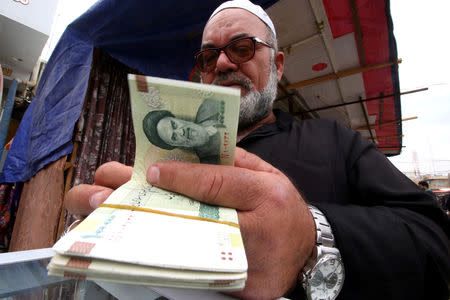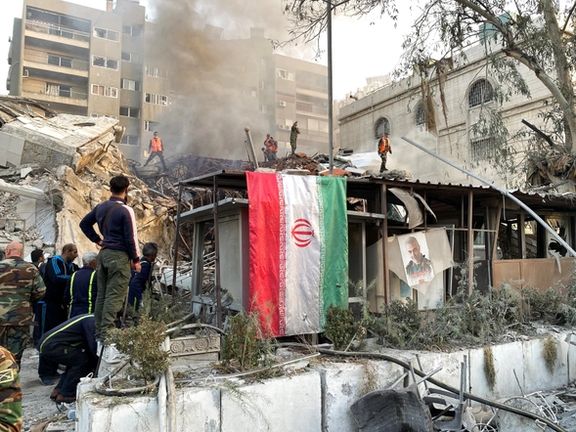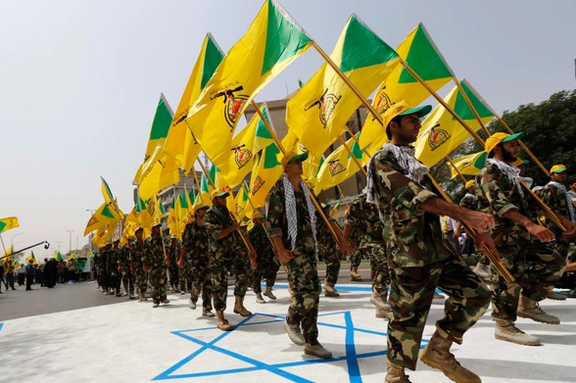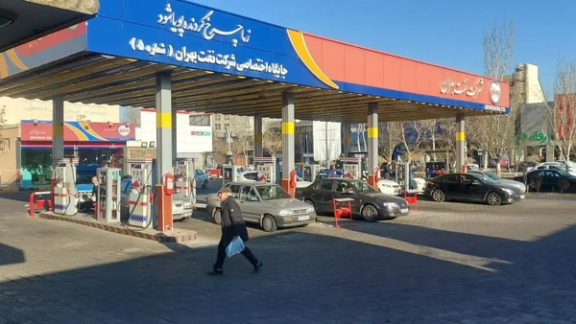Iran's rial hits new low after minister acknowledges slide

The Iranian currency hit yet another all-time low of 780,250 rials to the US dollar on Monday after the country’s economy minister acknowledged the significant devaluation of the currency.

The Iranian currency hit yet another all-time low of 780,250 rials to the US dollar on Monday after the country’s economy minister acknowledged the significant devaluation of the currency.
In a statement during a session of the Iranian parliament's economic commission, Abdolnasser Hemmati said that under normal political and economic circumstances the rial should be trading somewhere close to 73,000 per dollar—a figure significantly higher than Iran’s official exchange rate.
"Of course, this calculation assumes normal economic conditions and stable political and security situations," Hemmati said.
Upheaval in Syria and tensions with Israel along with threats to the economy as US President-elect Donald Trump prepares to take office were among the causes, Hemmati said.
“Given 30% inflation, it is impossible to maintain a stable exchange rate,” Hemmati said.
While Iran has multiple exchange rates, including the open market rate and the official rate, the open market rate most accurately reflects the true value of transactions.
Hemmati further noted that while the government’s official exchange rate is 400,000 rials to the dollar, many goods are traded in the market within the 700,000 to 800,000 rials range.
The reaction to Hemmati’s remarks in Tehran’s currency market was swift and severe. Within hours, the dollar climbed by over 20,000 rials. According to data from Tehran exchange offices, the dollar traded at 780,250 rials, while the exchange rate for dollar remittances rose to 790,800 rials.
The minister later retracted his remarks and said his comments were misinterpreted and that a video of the session had been edited. However, his commentary was widely covered in local media, and currency traders interpreted his comments as a potential sign of further devaluation of the rial.
Hemmati is scheduled to appear before parliament on Tuesday, alongside other officials including the Central Bank’s governor, Iranian media reported. Lawmakers are set to discuss measures to address exchange rate fluctuations and improve economic stability.
The rial has depreciated by over 25% since September, driven by regional conflicts and Iran’s setbacks in Syria and Lebanon.
Since the establishment of the Islamic government in 1979, the Iranian currency has undergone an 11,000-fold decline in value.

The Israeli prime minister on Monday vowed to continue targeting anyone who tries to harm the Jewish state, amid growing calls by Israeli officials for more direct strikes on Iran in response to the ongoing attacks on Tel Aviv by Tehran-backed Houthis.
"Israel is consolidating its deterrent power, it is striking at those who seek to harm it, it is collapsing Iran's terror branches one after the other," Benjamin Netanyahu told the Israeli Knesset.
Netanyahu said Tehran was still "busy licking the wounds from the blows we inflicted on them", adding he had instructed the Israeli military in recent days to attack strategic targets of Yemen's armed Houthi group in response to their missile launches at Israel.
"It is neither the first nor the last. We have destroyed significant terrorist assets that the Houthis have used, and the principle we have set is very simple – whoever tries to harm us, we will hit him with uncompromising force," Netanyahu added, according to a translation by the Israeli website Ynet.
The Israeli military and its American allies have launched multiple air raids against the Houthis' positions in recent days, but have failed to stop Houthi attacks on Israel.
The spokesman for the Houthis said the Iran-backed group launched two drone attacks against targets in Israel's Ashkelon and Tel Aviv on Monday.
Some Israeli officials believe their country must directly target the Islamic Republic, which has publicly declared its support for Yemen's Houthis.
"The solution is in Tehran: if you want to stop the Houthis' firing, you have to hit Iran directly," Israeli National Unity Front leader Benny Gantz told a meeting of his faction on Monday.
Mossad chief David Barnea also recommended Israel's political echelon attack Iran instead of Yemen's Houthis, a Ynet report quoted him as saying on Sunday. "We have to go for the head, for Iran," Barnea said in discussions on the issue in recent days.
In October 26 retaliatory strikes again Iran, Israel took out nearly the entirety of Iran’s air defense system, according to Western officials including the UK's Chief of Defense Staff.
In his Monday remarks, Netanyahu stopped short of explicitly discussing further attacks on Iran in response to the Houthis' strikes but vowed to prevent Tehran from acquiring nuclear weapons.
"We do not take our eyes off Iran that is threatening to eliminate us, and we are determined to stop Iran from reaching nuclear weapons as well as other weapons that could threaten our cities," he said.
Since May, top Iranian officials including Supreme Leader Ali Khamenei's adviser, Kamal Kharrazi, have warned that if Iran's nuclear installations are attacked, the Islamic Republic will shift its nuclear doctrine.
So far, Tehran has been insisting that its nuclear program is entirely peaceful, in spite of having exceeded international limits on uranium enrichment and accelerating its nuclear program.
In October, 39 lawmakers called for changing the nuclear doctrine without mentioning an attack on nuclear facilities but citing tensions with Israel.
The calls for the pursuit of nuclear weapons have grown in Iran following the Israeli airstrikes destroying the Islamic Republic's air defense batteries.

The pro-Hezbollah Lebanese newspaper Al-Akhbar reported that Iranian-backed militias in Iraq have reached an agreement with the Iraqi government to halt attacks on Israel to avoid destabilizing the country.
The move reflects concerns about escalating conflicts in the region and fears of Iraqi security being endangered after insurgents took control in neighboring Syria.
Iranian-backed militias in Iraq have launched multiple attacks targeting Israel since the Hamas attack on the Jewish state on October 7, 2023.
Following the assault, these militias began their operations by first targeting US forces in Syria and Iraq, before escalating their actions to include strikes against Israel itself.
Known as the Islamic Resistance in Iraq, the groups are a patchwork of Shi'ite militias and factions. The factions joined forces to largely defeat radical Sunni Islamic State in Iraq but continue to exert broad military and political control.
They typically use drones to target Israel, as Iraq does not share a land border with Israel.
A member of the al-Nujaba militia whose name was withheld expressed apprehension that the resurgence of Islamic State in Iraq could mirror or surpass the devastation experienced during the Syrian conflict.
The militia leader told al-Akhbar that the militias decided not to interfere in Syrian affairs and "to follow the situation from a distance, in addition to waiting to understand the orientations of the US President-elect, Donald Trump, and his policy towards the Middle East, specifically Iran."
Harakat Hezbollah al-Nujaba, officially known as the 12th Brigade, is a radical Iraqi Shi'ite paramilitary group primarily active in Iraq and formerly in Ba'athist Syria.
Founded in 2013 by Akram al-Kaabi, the group was established to support Bashar al-Assad's government in Syria against Islamist rebels. It is backed by the Iran’s Islamic Revolutionary Guards' Quds Force, which provides financial support, weapons and training for its members.
The source suggested that a resurgence of Islamic State could upend the relative stability achieved in Iraq.
This follows broader US efforts to curtail the influence of Iranian-aligned forces in Iraq. The Iraqi newspaper Al-Mada mentioned leaked information suggesting a phone conversation between Iraqi Prime Minister Mohammed Shia' al-Sudani and Ahmad al-Shara', leader of Syrian new rulers, mediated by Turkey.
Concerns about ISIS sleeper cells activating across Iraq were part of the discussions.
Prime Minister al-Sudani confirmed Israeli threats to target positions of Iran-backed groups in Iraq, a claim also echoed in Al-Akhbar.
A member of the Kata’ib Sayyid al-Shuhada group also said that their operations against Israel were closely tied to Lebanese Hezbollah's campaigns and ceased following the ceasefire in Lebanon.

The militias' attacks on Israel were "linked to the operations of Lebanese Hezbollah. When the ceasefire was reached in Lebanon, the operations of the Iraqi factions stopped." The spokesman for the Kata’ib Sayyid al-Shuhada militia, Kazem al-Fartousi told the Lebanese daily.
"There are also partners in Iraq who have opinions and reservations about these operations, and they must be listened to."
Kata'ib Sayyid al-Shuhada', officially known as the 14th Brigade, is a radical Iraqi Shiite paramilitary group formed in 2013. Its stated mission is to protect Shi'ite shrines across the globe, preserve Iraqi unity, and put an end to the sectarian conflict. KSS is funded, trained and equipped by the IRGC's Quds Force and Hezbollah.
Prior to these developments, Iran International reported that commanders of the al-Nujaba movement, backed by Iran's Islamic Revolutionary Guard Corps (IRGC), had secretly visited Tehran. This visit underscores ongoing coordination between Iran and its allied militias in Iraq amid evolving regional dynamics.
The reports reflect complex regional calculations, with Iraqi militias seeking to balance their stance based on the domestic power balance and regional military situation.

Iran's rich cultural and entertainment landscape, once a part of daily life for Iranians, has become so expensive amid rising costs of living that it has become prohibitively expensive for most families.
Simple entertainment such as going to the cinema, buying books, attending theater performances or even subscribing to home streaming services were once standard family activities. But now, they are slowly slipping out of reach for the average Iranian household, as at least one third of the country is living below the poverty line.
Iran's Farhikhtegan newspaper recently broke down the problem by numbers.
“Cinema, books, theater, home streaming, and concerts cost a family an average of about 73,000,000 rials ($94.8), while their minimum income is around 116,000,000 rials ($150 per month). This means that if they want to spend exclusively on cultural activities, they would have to allocate more than half of their income for this purpose."
Before the recent rise in the value of the dollar and the resulting devaluation of the rial, the average monthly income for a family of four was around $200.
However, due to the currency’s continued decline, the average monthly income has now fallen to just $150, further exacerbating the financial strain on Iranian families.
As of this month, the Iranian rial has plummeted to approximately 770,000 rials per US dollar. The sharp depreciation has further deepened the economic hardship for the average Iranian citizen, pushing basic living expenses, including food and medicine, out of reach for many.
The depreciation of the rial, driven by a mix of economic sanctions, inflation, and political instability, has devastated the purchasing power of Iranians, many of whom are now even forced to barter for basic goods like food and are struggling to heat their homes during the bleak winter months.
Cinema and books: The new luxuries
In Tehran, a typical movie ticket costs about 800,000 rials (roughly $1 USD) per person. For a family of four, that means a trip to the cinema costs 3,200,000 rials (around $4.2) just for the tickets.
To watch a film at one of Tehran's more popular cinemas, located at Iran Mall, using an internet taxi for a round-trip journey can cost approximately 3,500,000 rials ($4.5), making the total cost of the cinema outing about 7,000,000 rials ($9.1)—excluding snacks or meals, which could push the total closer to 20,000,000 rials ($26).

Children's books average about 1,400,000 rials ($1.8) per book, and adult books cost approximately 2,060,000 rials ($2.7) each. If a family of four buys three children's books and three adult books in a month, they would spend around 10,000,000 rials ($13). Additionally, supplementary or educational books cost roughly 3,040,000 rials ($3.9 USD) each, adding further strain to a family’s budget.
Theater and concerts: A dream for the few
The cost of attending theater performances has also skyrocketed. High-end theater tickets now range from 6000,000 rials ($7.8) to 14,000,000 rials ($18 USD) for premium shows.
For regular performances, prices range from 4,000,000 rials ($5.2 USD) to 6000,000 rials ($7.8). Even the more affordable comedy shows, which are not quite theater but have gained popularity, cost between 1,500,000 rials ($1.9) and 3,000,000 rials ($3.9).

Concerts, too, are no longer a modest indulgence. Ticket prices range from 2,000,000 rials ($2.6) to 11,000,000 rials ($14.3) for popular performances. On average, a family of four would pay around 26,000,000 rials ($34) for concert tickets alone, without factoring in transportation and food costs.
Subscription services for home entertainment have also become increasingly expensive. For instance, VOD platforms like Filimo, Namava, and FilmNet charge between 1,500,000 rials ($1.9) and 1,650,000 rials ($2.1) per month.
Additionally, families must pay for internet services, which can cost between 2,000,000 rials ($2.6) and 3,000,000 rials ($3.9) monthly. This means that a family could spend up to 8,000,000 rials ($10.4) per month just to access home streaming content.

Iran is due to ease fuel price subsidies, according to documents reviewed by Iran International, in a politically sensitive move likely approved by the country's top leadership which is due to deepen economic pain.
Costs of living are soaring in Iran while the currency has repeatedly plumbed new historic lows, posing a challenge to Iran's rulers as they face regional military setbacks and the return of a maximum pressure sanctions policy under Donald Trump.
Iranians had already sensed something was amiss when some fuel stations began installing eight-digit price displays at fuel stations.
The policy change comes in the form of a letter from the National Iranian Oil Refining and Distribution Company (NIORDC), part of the oil ministry, to fuel stations outlining steps to implement the plan.
It is set to massively reduce the monthly distribution of subsidized gasoline from the current 87 million liters to 42.5 million.
Under the new scheme, citizens will be entitled to 15 liters of subsidized gasoline monthly at 20,000 rials (2.5 US cents) per liter, up from the previous rate of 15,000 rials (2 cents).
The NPDC denied any change was forthcoming. The oil ministry “has no plans to change gasoline prices,” adding the ministry “does not have the authority to do so.”
A spokesperson for the Planning and Budget Organization last month underscored that any change in setting fuel products was treated as an utmost priority and "requires decision-making at the highest levels of national management."
Fuel price increases in Iran happen outside the budget, as in 2019 when gasoline prices rose with the Supreme Leader’s backing, bypassing parliamentary oversight.
Under the new policy, semi-subsidized gasoline will cost 80,000 rials (10 cents) per liter. The average income of Iranians per month is now around $150 while the costs for a family of four is at least $500 per month.
At least one third of the country is also living below the poverty line.
The government plans to simultaneously reduce the semi-subsidized gasoline quota from 100 liters to 50 liters per month and limit the allocation of gasoline to two vehicles per household and one vehicle per individual.
This week, Ali Fadavi, deputy commander of the Revolutionary Guards (IRGC), said nationwide shutdowns and blackouts due to massive energy shortages were "disgraceful".
"We are the world's top country in energy, and we rank second in gas reserves. Yet, we cannot solve the energy problem," he said.
"Updating fuel dispensers and upgrading station infrastructure are routine measures to prevent disruptions in operations," the NPDC said in response to reports about the new space for price digits at fuel pumps.
Despite the denial, a recent television interview with President Masoud Pezeshkian fueled public concerns about rising costs. He said during the interview early in December that the state is short of foreign currency and without parliamentary allocation of dollars for imports, gasoline prices would rise.
Reports also suggest a brewing conflict between the government and parliament over accountability for the price adjustments, further complicating the public narrative.
Iran’s revised gasoline pricing strategy comes amid ongoing economic challenges, exacerbated by international sanctions. Analysts have noted the potential for further restrictions on Iran’s gasoline imports under a new US administration.
The Washington Institute highlighted that such sanctions could intensify Iran's economic struggles by targeting its refined oil imports, compounding existing sanctions on crude oil exports, levied for Iran's nuclear program, support for Russia's war on Ukraine, and human rights abuses at home.

Dutch supermarket chain Spar has been accused of helping Iran evade international sanctions, according to a report by Dutch newspaper de Volkskrant.
Leaked internal documents from a whistleblower suggest that Spar's license in Iran was used to facilitate transactions involving Iran’s Revolutionary Guard (IRGC).
Despite Dutch Ambassador Frank Mollen promoting Spar's operations in Tehran as an example of successful business engagement in August 2022, the documents reveal that Spar Iran was allegedly involved in questionable activities, such as importing Western technology and issuing Schengen visas for individuals connected to the IRGC.
Blue River, managing Spar's Iran operations, allegedly acquired Western equipment, like HP servers and laptops, under false pretenses, claiming they were for supermarket use. Security experts noted such technology is unnecessary for a small grocery chain.
Concerns also emerged over Spar Iran's S-Pay voucher system, which allows Iranians abroad to send credits to relatives in Iran. Leaked emails suggest plans to convert these vouchers into cash, potentially violating sanctions.